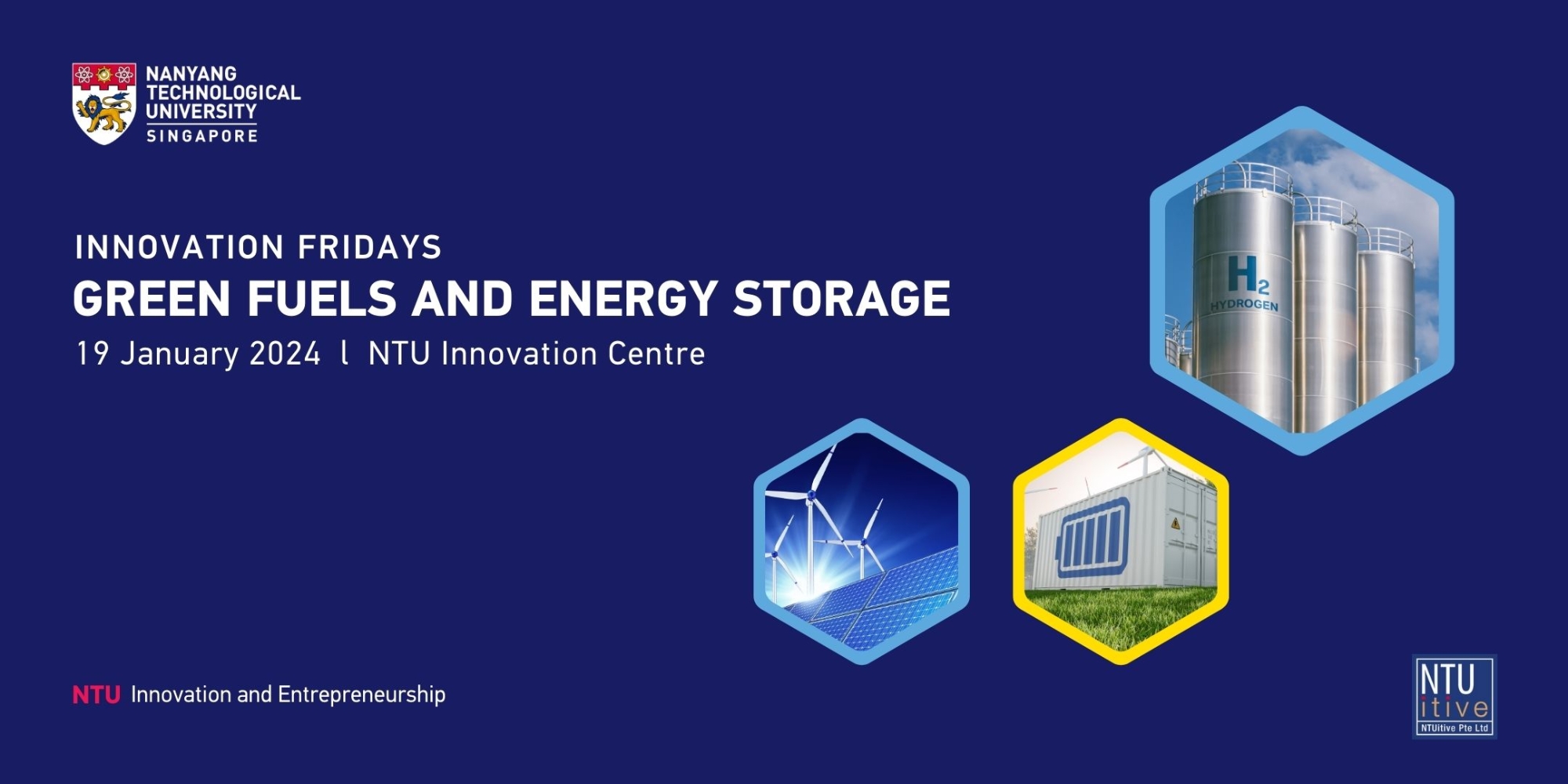January
2024
Innovation Fridays: Green Fuels and Energy Storage

Discover NTU Innovations for Green Fuels and Energy Storage
This event has ended. If you are interested in any of the below technologies, please email [email protected]
PROGRAMME (subject to changes)
1.15pm: Registration l Interaction with Showcases
2.00pm: Welcome
2.05pm: Ammonia e-Cracking by Professor Jason Xu Zhichuan, School of Materials Science & Engineering, Nanyang Technological University, Singapore
This presentation will introduce our recent progress in an electrochemical approach for hydrogen generation from ammonia (e-cracking). The approach gives very high energy efficiency and does not need gas separation step, which are advantages as compared to thermal cracking method. The e-cracking will enable the ability towards decentralized hydrogen generation and reduce the cost in hydrogen transportation.
2.25pm: *Biomass Waste to Green Chemical and Fuel by Associate Professor Li Hong, School of Mechanical & Aerospace Engineering, Nanyang Technological University, Singapore
Biomass derived green chemical and fuel hold great promise for decarbonizing industries. The most successful and mature biofuel is the 1st-generation bioethanol, which is mainly made from food crop feedstock. The 2nd-generation bioethanol from lignocellulosic biomass feedstock faces many challenges. The major technology barrier to use non-crop lignocellulosic biomass (e.g., woody biomass) is lack of a time-saving and energy-efficient pretreatment process to obtain monosaccharides. We focus on developing a rationally designed process to convert biomass waste to green chemicals which can be further upgraded to fuels.
* Presentation is part of the showcase segment
2.45pm: Perovskite Solar by Associate Professor Nripan Mathews, School of Materials Science & Engineering, Nanyang Technological University, Singapore
Halide perovskite solar cells are a novel solar cell technology that has achieved efficiencies comparable to the incumbent photovoltaic technologies. In addition to high efficiencies, they offer other advantages such as printability, flexibility and colour tunability that make them relevant for a wide variety of applications. This talk would cover the developments in this area and efforts to scale up the solar cells to larger areas.
3.05pm: *Construct Rechargeable Aqueous Al Ion Batteries by Professor Alex Yan Qingyu, School of Materials Science & Engineering, Nanyang Technological University, Singapore
Aqueous Al-ion batteries (AAIBs) are the subject of great interest due to the inherent safety and high theoretical capacity of aluminum. The high abundancy and easy accessibility of aluminium raw materials further make AAIBs appealing for grid-scale energy storage. However, the passivating oxide film formation and hydrogen side reactions at the aluminum anode, as well as limited availability of cathode lead to low discharge voltage and poor cycling stability. Here, we demonstrate a few strategy on the AAIBs development including new anode development, cathode development and electrolyte selection to provide new opportunities for the development of high-performance and low-cost AAIBs for practical applications.
* Presentation is part of the showcase segment
3.25pm: Industry Talk: VFlowTech by Dr Avishek Kumar, Co-Founder and CEO
Long Duration Vanadium Redox Energy Storage for Net Zero Solution
Due to the intermittent nature of solar or wind power generation, energy storage is a critical enabler for the energy transition to renewables. The present technology does not enable large-scale energy storage well. Although lithium-ion batteries are the most widely used technology for electric vehicles, employing them in grid applications offers challenges (performance degradation, safety risk, and so on). As a result, alternative energy storage technologies are being researched. Flow batteries have long been seen as a potential technology for long-term storage due to its scalability and durability. Flow batteries, on the other hand, have historically suffered from parasitic losses, which affected their round-trip efficiency, energy density, and operating temperatures. VFlowTech (VFT) has spent eight years researching solutions to every flow battery problem. In terms of thermal window, energy density, and round-trip efficiency, VFT Vanadium Redox flow battery outperforms conventional flow batteries. The Seminar will discuss the market potential for energy storage and in particular the use cases for long-term energy storage solutions and their applicability for net zero solutions.
3.45pm: Interaction with Showcases l Networking
5.00pm: End of Event
SHOWCASES:
- Aqueous Batteries for Energy Storage
- Solutions for Hydrogen Production Technologies
- Hydrogen Fuel Cell

.jpg)